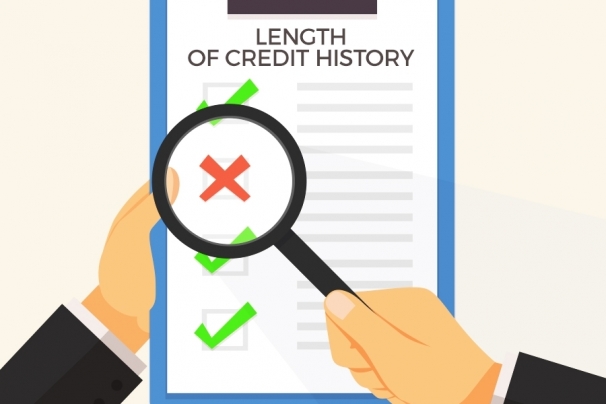Have you ever wondered whether that old credit card that you opened up in college still benefits you?
Well, lucky for you, it actually can in some ways.
That’s because a major aspect of your credit score makeup comes from the length of your overall credit history. As well as the average length of credit history on individual accounts you have.
This article will break down this crucial element of your credit score, and help you to understand how and why this has an impact on your economic and financial health.
Should I Close My Credit Card Account If I Don’t Use It Anymore?
So, there are two different ways of looking at the issue of whether or not you should close your old accounts.
The first side is pretty complex.
Closing an old account that is no longer in use, or is rarely in use, makes it more difficult for people to steal your identity. Additionally, it might help you avoid some annual fees on accounts which charge you to use the card each year.
What happens if there’s still a balance on the card that you’d like to close?
It’s usually possible to close the account while still making payments. However, you’ll need to confirm that there won’t be any additional fees if you choose to do this.
The other side of the coin is that closing the account might have a negative impact on your credit score in the end.
This has a lot to do with maintaining a low debt-to-credit ratio.
If you close an account, that essentially means that your debt remains the same (via the balance you have on other cards and accounts) but your available credit decreases by whatever the upper limit on the card you closed was.
For example, if you have a total credit limit of $4,000 and two credit cards, and you have a balance of $,1000 on one card and $0 on the other, you might think about closing the old card which you are not using.
However, if both cards have a limit of $2,000, then your available credit just dropped from $4,000 to $2000, while your debt remains the same.
Therefore, your utilization ratio increased from 25% to 50% by closing this old account.
This is the main drawback to closing an account.
Total length of credit history and average length
The other aspect closing an account can affect is your total and average credit history length.
Credit bureaus use average account length to see if you have a reliable and long credit history.
Let’s say your oldest account is 5 years old. Closing that account will decrease your total credit history since it will no longer be factored in. Whichever account you opened afterwards will now become your oldest account.
The general consensus is that you shouldn’t close your oldest credit account, even if you aren’t using it. This is because it will decrease the overall length of your credit history, which has a negative impact on your credit score.
What’s The Average Credit Score For Americans?
The above information may lead you to wonder what is considered to be a good credit score in America anyways?
The average score for the United States is 687, according to the Census Bureau.
However, that definitely ranges by state. Many states in the southeast are reporting generally lower scores and states in the west coast and northeast generally report higher scores.
A good credit score is considered to be above 600.
But, it is all about context, and your credit score definitely isn’t the only thing that matters in determining financial health.
What’s the average account age for Americans?
Research shows that the average age of accounts for Americans has been increasing over time, as more Americans are working on increasing their credit history.
The average age of credit history is about 5-6 years.
However, this will vary by state and also by demographic group and age group in the general population.
The Best Length of Credit For Certain Types of Credit
The best average length of credit history will definitely vary depending on what kind of credit account it is.
For example, a credit card account has a very different impact than a mortgage.
The best average age for a mortgage is older, whereas the best average age for a credit card is about mid-range.
Having a long history on your mortgage will do more to build your credit score than having a long history on a credit card.
But in both scenarios, the improvement banks on making regular and timely payments each month and staying within your reasonable credit limits.
Your credit history and credit mix account for about 10% of your total credit score.
This is essential in making sure creditors and potential lenders can see that you have a responsible credit history and will be reliable in paying back your loans.
Things you should never do when it comes to keeping your credit score healthy
In terms of length of credit history, there are some hard and fast tips you can follow about what not to do if you want to keep your credit healthy.
First off, never close multiple accounts at once.
This is pretty much a guarantee of decreasing your credit score because your credit utilization ratio will go up.
Also, never just throw away your credit card, because it will not actually close the account.
Go online or to the bank in person to close your account.
Lastly, never put all your balance on one card and none on the others.
This will also mess up your utilization ratio.
Conclusion on how to have a good average mix of account history lengths
In general, your want your average account age to be as old as possible.
You don’t want too many accounts, and try to keep your balances low.
Why does it matter?
Well, the longer your account history, the more evidence a lender has to judge whether you will be a responsible borrower.
From their perspective, the more information, the better.
The credit history duration shows how experienced you are with working in the credit system.
If you have a long history, it can be presumed that you know how it works and what is expected of you.
The specifics of how a certain choice could influence your overall history of loan repayments relies on which calculation metric and system is being utilized.
It’s advantageous to keep your most established credit accounts open and use them at least every once and a while.
Regardless of whether the impacts of shutting down your oldest accounts are quick or postponed, doing so will typically mean your credit score will drop.
Try to open up a few credit cards early in your credit history, and then keep them for a while without opening new accounts after a couple of years.
Doing this will give you a stable and growing credit score.
It’s your score to keep up. So remain well-informed on the elements that may influence your credit well being and settle on the choices that are appropriate for you.
Here’s how credit score is determined outside of Length Of Credit:
- Length of Credit History
- Types of Credit
This concludes part 4 of 5 on how credit score is determined and why it’s so important for you, an American financial consumer, to understand this.









Leave A Comment